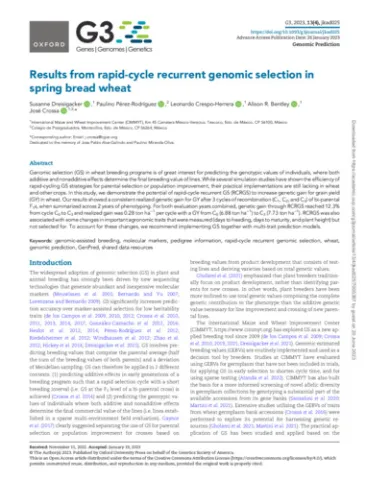Results from rapid-cycle recurrent genomic selection in spring bread wheat

Abstract
Genomic selection (GS) in wheat breeding programs is of great interest for predicting the genotypic values of individuals, where both additive and nonadditive effects determine the final breeding value of lines. While several simulation studies have shown the efficiency of rapid-cycling GS strategies for parental selection or population improvement, their practical implementations are still lacking in wheat and other crops. In this study, we demonstrate the potential of rapid-cycle recurrent GS (RCRGS) to increase genetic gain for grain yield (GY) in wheat. Our results showed a consistent realized genetic gain for GY after 3 cycles of recombination (C1, C2, and C3) of bi-parental F1s, when summarized across 2 years of phenotyping. For both evaluation years combined, genetic gain through RCRGS reached 12.3% from cycle C0 to C3 and realized gain was 0.28 ton ha−1 per cycle with a GY from C0 (6.88 ton ha−1) to C3 (7.73 ton ha−1). RCRGS was also associated with some changes in important agronomic traits that were measured (days to heading, days to maturity, and plant height) but not selected for. To account for these changes, we recommend implementing GS together with multi-trait prediction models.
